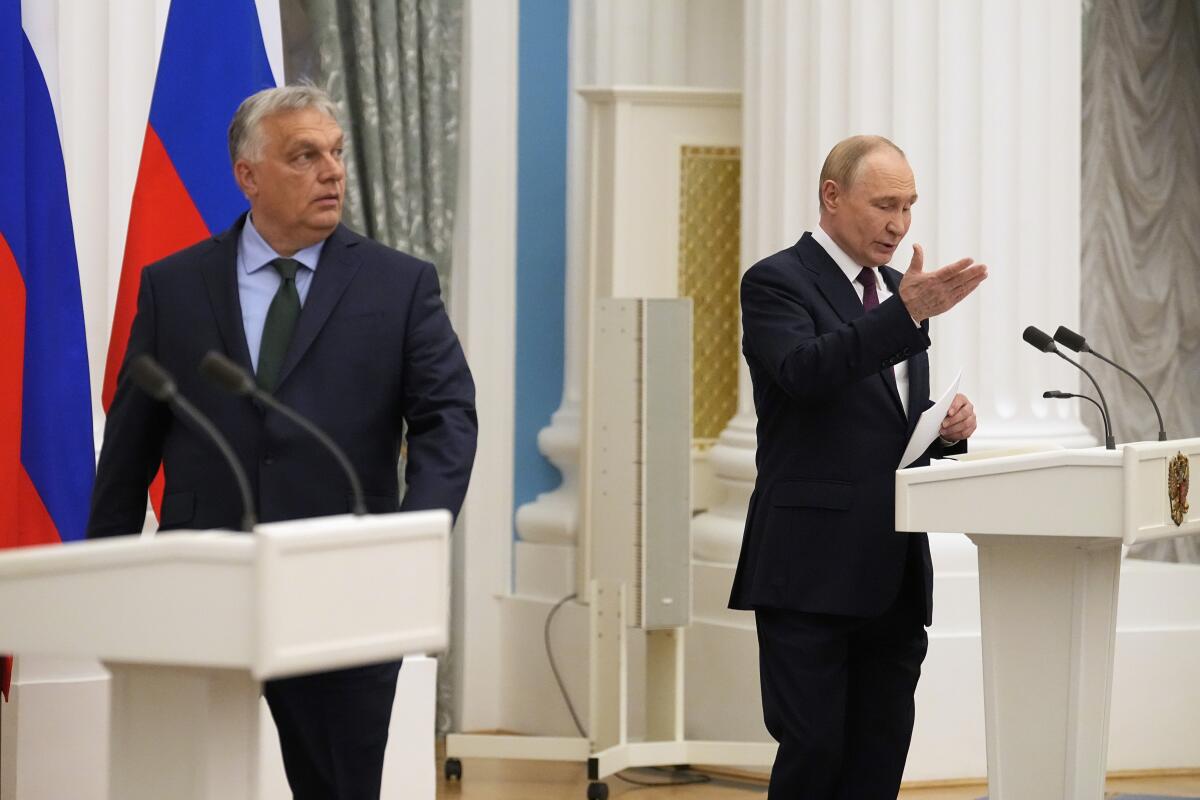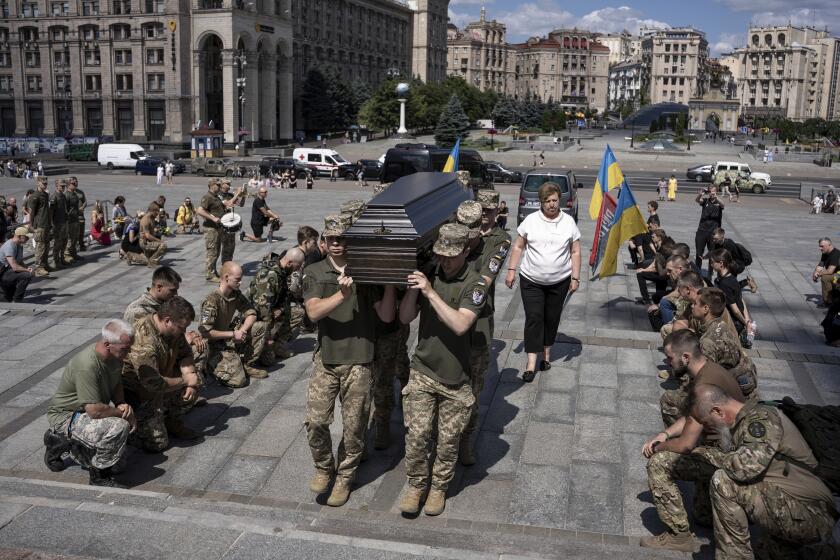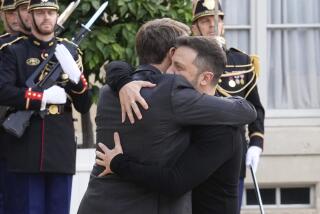Hungarian leader Orbán’s visit with Putin in Moscow draws condemnation

- Share via
MOSCOW — Hungarian Prime Minister Viktor Orbán’s visit to Moscow to discuss prospects for a peaceful settlement in Ukraine with Russian President Vladimir Putin was a rare trip to Russia by a European leader and it drew condemnation from Kyiv and European leaders.
Orbán’s visit Friday came only days after he made a similar unannounced trip to Ukraine, where he met with President Volodymyr Zelensky and proposed that Ukraine consider agreeing to an immediate cease-fire with Russia.
“The number of countries that can talk to both warring sides is diminishing,” Orbán said. “Hungary is slowly becoming the only country in Europe that can speak to everyone.”
Hungary assumed the rotating presidency of the EU at the start of July and Putin suggested that Orbán had come to Moscow as a top representative of the European Council. Several top European officials dismissed that suggestion and said Orbán had no mandate for anything beyond a discussion about bilateral relations.
The Hungarian prime minister, widely seen as having the warmest relations with Putin among EU leaders, has routinely blocked, delayed or watered down EU efforts to assist Kyiv and impose sanctions on Moscow for its actions in Ukraine. He has long argued for a cessation of hostilities in Ukraine but without outlining what that might mean for the country’s territorial integrity or future security.
Ukrainians displaced by war find new purpose in Shakespeare’s play of love, loss and madness, bringing their blood-red version to the bard’s hometown.
That posture has frustrated Hungary’s EU and NATO allies, who have denounced Russia’s actions as a breach of international law and a threat to the security of countries in Eastern Europe.
Speaking after the Kremlin talks, Orbán said he told Putin that “Europe needs peace,” adding that he asked the Russian leader for his thoughts on existing peace plans and whether he believed a cease-fire could precede any potential peace talks.
Standing alongside Orbán, Putin declared that Russia wouldn’t accept any cease-fire or temporary break in hostilities that would allow Ukraine “to recoup losses, regroup and rearm.”
The Russian leader repeated his demand that Ukraine withdraw its troops from the four regions that Moscow claims to have annexed in 2022 as a condition for any prospective peace talks. Ukraine and its Western allies have rejected that demand, suggesting it is akin to asking Kyiv to withdraw from its own territory.
Russian strikes on Ukraine increase civilian death toll and leave more than100,000 households without power and cut water to a regional capital.
Putin said they also exchanged views on the current state of Russia-EU relations, which are “now at their lowest point.”
Hungary at the beginning of the month took over the six-month rotating presidency of the EU Council, a largely formal role that can be used to shape the bloc’s policy agenda.
Orbán said that he looks at his six-month presidency of the EU Council as a “peace mission,” saying the fighting in Ukraine had burdened Europe’s security and economy, and that only dialogue and diplomacy could bring an end to the hostilities.
“I wanted to know where we can find the shortest road to peace,” Orbán said of his visit, adding that he’d also asked Putin on his view on Europe’s long-term security after hostilities end in Ukraine.
Kremlin spokesman Dmitry Peskov noted that the visit to Moscow was Orbán’s idea and was agreed to only on Wednesday, adding that Moscow valued Orbán’s ”strong, clear and consistent course” aimed at trying to resolve the conflict.
Ukraine’s Foreign Ministry said in a statement that Orbán’s decision to visit Moscow was made “without approval or coordination” with Kyiv. It added that “the principle of ‘no agreements on Ukraine without Ukraine’ remains inviolable for our country” and called on all states to strictly adhere to it.
European officials have heavily criticized Orbán’s trip to Moscow, the first such visit by a European leader since Austrian Chancellor Karl Nehammer met with Putin in the Kremlin in April 2022, just weeks after Russia sent troops into Ukraine.
“This is about appeasement. It’s not about peace,” European Commission spokesperson Eric Mamer said.
The EU’s foreign policy chief, Josep Borrell, said in a statement that Orbán’s visit to Moscow “takes place, exclusively, in the framework of the bilateral relations between Hungary and Russia.”
“Prime Minister Orbán has not received any mandate from the EU Council to visit Moscow,” Borrell said, adding that his “position excludes official contacts between the EU and President Putin. The Hungarian Prime Minister is thus not representing the EU in any form.”
Orbán quickly shot back on the social media platform X, dismissing Borrel’s statement as “the Brusselian bureaucratic nonsense that yielded no results in finding a way to peace.”
White House Press Secretary Karine Jean-Pierre voiced concern about Orbán’s trip to Moscow, noting that it “will not advance the cause of peace and is counterproductive to promoting Ukraine’s sovereignty, territorial integrity, and independence.”
NATO Secretary-General Jens Stoltenberg said Orbán informed him in advance about his travel to Moscow but that he “is not representing NATO at these meetings.”
Kaja Kallas, the outgoing Estonian prime minister nominated to become the next EU foreign policy chief, accused Orbán of “exploiting” the presidency and said the Hungarian leader is trying “to sow confusion.”
“The EU is united, clearly behind Ukraine and against Russian aggression,” Kallas, a staunch supporter of Ukraine, wrote on X.
Associated Press writer Isachenkov reported from Moscow, Spike from Budapest, Hungary. AP writers Dasha Litvinova in Tallinn, Estonia, and Emma Burrows in London contributed to this report.
More to Read
Sign up for Essential California
The most important California stories and recommendations in your inbox every morning.
You may occasionally receive promotional content from the Los Angeles Times.












